“What are words, anyway? If you tell a lie with words, you cause all kinds of people to get sick. If you tell people the real truth, they get together and they get well.”
--Woody Guthrie, Bound for Glory
Dear Beatrice,
A little depressed today. I didn’t get much sleep last night. I was up til like 4am editing Hibbleton Independent because it goes to the printer today.
I am in a weird place, like, mentally. On the one hand, I am fulfilled by all the creative projects I’m involved in—our band playing more gigs, the art opening on Friday, plus the zine show at Bookmachine, the magazine being released in a couple weeks. I feel like I am really rolling, creatively.
But then I am sort of overwhelmed and depressed by my financial situation—I have like $400 in the bank and rent is due. I don’t have health care or car insurance. I feel, as always, like I am dancing on the edge of the abyss of financial ruin.
But I get paid today, and I can probably afford everything—just barely, like always. I hold my possessions loosely, and I am supported by a community of friends and family.
I will survive, as I have always done. I’m a survivor. There are many things I am willing to do without, and a couple things I am not willing to give up, things I will fight tooth and nail for-- the gallery, the book store. These are things I refuse to let go of, because I believe in them so fiercely. And so each day I teach my classes for very little pay and I figure out a way to hold onto what I choose to hold onto. It is a struggle, but one that brings me great joy, and sometimes great anxiety.
And each month a miracle happens. I survive.
And I’m encouraged by something else. Last night, as I was waiting for Tony to finish laying out the magazine, I started writing. Just writing, by hand, in this notebook, and it was like jazz. It was flowing. I was inspired. I was “in the zone” like I haven’t been in a long while. I was an artist using words, blending passion and knowledge and experience into story. I mean, I was REALLY rolling. I was describing an art opening and trying to transform the mundane into the sublime, which I usually try to do when I write, and last night it was just clicking.
One thing I have struggled with, as a writer, is the tension between showing and telling, like the difference between journal writing and story writing. That is the struggle of a memoirist. But last night, I swear, I found such a perfect balance. Around 3am I was writing and I was in a state bordering on the ecstatic.
As an artist, you can’t always be in that state. But, when it comes, let it come. Ride that wave. If you let it take you, you might end up somewhere really beautiful.
So, despite my financial woes and occasional depression, I was inspired last night to continue the task I have done my whole life—to write. I don’t know what will happen with my book. I only feel compelled to complete it. I think it will be done soon.
So I’ll hang in there, through my depression days and lonely nights. I will embrace my friends and my family and my passions, and I will be okay. I will be okay.
Sincerely,
Jesse
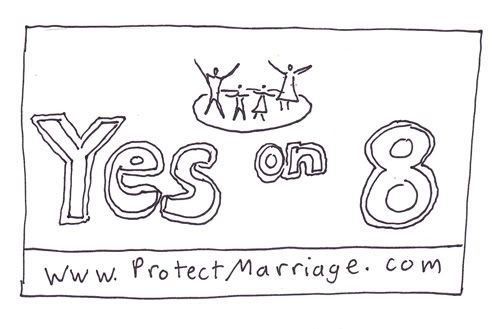
Two men at Subway see a newspaper that mentions Prop 8. One says, “They’re trying to take something unnatural and make it natural.” He has this smug certainty about him. If I am to be a Christian again, it must be of a different sort than what I have experienced.
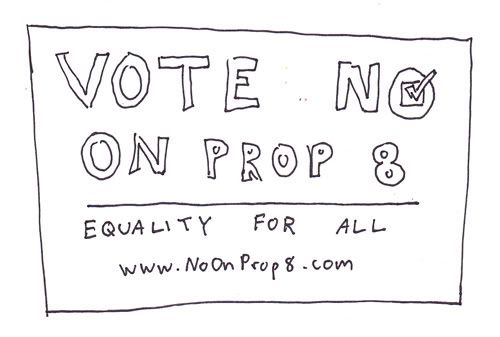
...
I spend the afternoon reading the Fullerton Observer, the local paper. I have a newfound interest in local politics—in the sometimes murky waters of government budgets and development and corporate interests and propositions and elections.
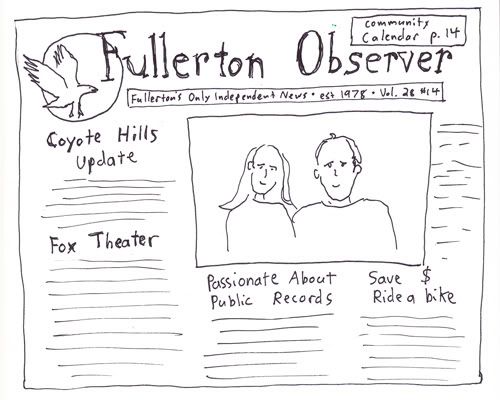
I am unhappy with the corruption I see in politics—corporations basically bribing lawmakers to promote their own interests, regardless of how it will actually affect peoples’ lives.
I have to believe that there are honest politicians, true public servants who feel passionately about the people and community they serve, and are not out to make a buck—people whose reward is the better world they help create.
I am beginning to understand the complex systems that govern my life—bureaucracies and agencies and corporations. Once you sort of understand the system you are in, once you are aware of it, you can perhaps try to change it.
There’s that joke about the wise old fish who swims up to some younger fish and says, “Mornin’ boys. How’s the water?” And the younger fish reply, “What the hell is water?”
It’s about being aware of the culture and society that surrounds you, pulling the curtain back, understanding what exactly you are swimming in.
As I drive to my therapist’s office through Brea, through this ugly suburban sprawl that no one else seems to mind, I think about these things and feel a little scared, a little lonely.
Because if you understand the system, and disagree with it, where does that leave you? What can you hold onto? What can you do?
...
One of the last, large, natural open spaces in north Orange County is Coyote Hills—a 510-acre patch of land in Fullerton. It is currently owned by Chevron, because they used to drill oil there. They stopped drilling years ago, and have spent the last 20-30 years trying to get Fullerton City Council to approve a massive housing/retail development.
Having lived in Fullerton for most of my life, I have watched as development companies (often subsidiaries of big oil) have developed nearly every inch of natural open space. The story of Orange County land use in the past 50 years is one of massive development of open space.
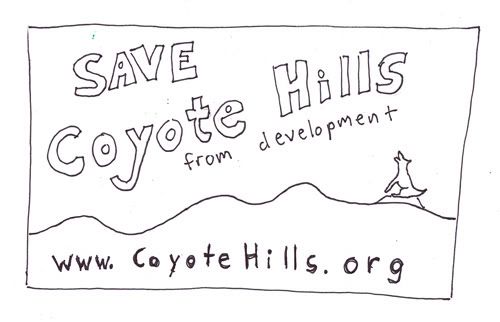
Chevron wants to develop Coyote Hills, and there is a community group, Friends of Coyote Hills, that is trying to protect it from development, to preserve it as a natural open space. I begin following this issue in the Fullerton Observer. I begin attending City Council meetings, listening to Chevron’s proposals, listening to the Friends of Coyote Hills, listening to Don Bankhead and Dick Jones, who preside over those meetings with a kind of Godfather-esque condescending attitude that is, frankly, repellent to me. They do not seem sympathetic to the Friends of Coyote Hills.
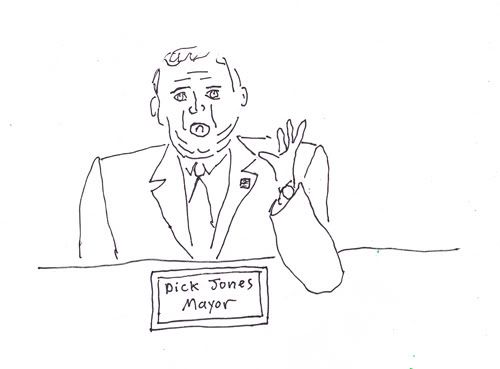
And so, when the meeting comes when the City Council is to vote on the Coyote Hills development, I invite my friends to show up in support of the Friends of Coyote Hills. I prepare a speech. As part of my preparation, I visit the city clerk’s office to look at who had made large campaign contributions to the city council members’ campaigns. I find what I expect. Every member of City Council has taken large campaign contributions from development companies.
When my turn comes to give my speech, I am shaking like a leaf. But I stand up and read what I have prepared. I point out that the only folks who seem to support the development are those with a vested financial interest, including City Council. I point out the obvious—that the vast majority of those present at the meeting are opposed to the development, ordinary residents of Fullerton who care enough about their community to show up in protest. I urge the council to do what is best for Fullerton, and not for the developers. I close with this question, “Will the fact that you have taken large campaign contributions from developers affect your decision on this issue?” There is an awkward silence, which Don Bankhead finally breaks with, “We’re not here to answer your questions.” When I finish my speech, the crowd cheers. I feel a calling.
I am pleasantly shocked when the City Council votes down the development proposal 3-2.
About a week later, after an Art Walk meeting, I’m talking to Mike Magoski, a fellow gallery owner, and he says, “A lot of people want you to run for City Council.”
The next day, I walk to City Hall and file my papers. I feel ill-prepared, ill-equipped, but I am compelled by a passion I cannot deny. I am afraid yet resolved. I have learned, in my life, not to be motivated by fear. Instead, I have tried to follow my heart.
I’ve never run for public office before, I am not wealthy, and I am not “well-connected” with local politics. But I have passion, I have creativity, I have a community of supporters, and I have conviction that I can make a positive difference, even if I lose. I am inspired by figures like Harvey Milk, who showed me that, with passion and persistence, you can change the world.
I am actually on unemployment when I file my paperwork to run for City Council. Such is life for adjunct (part-time) faculty in California—you rarely get health benefits, and often don’t get paid over the summer, so many of us go on unemployment for a few months, so we can pay our bills. Suffice it to say that I do not have a big budget for my campaign. I figure I can afford to spend $1000 on my campaign. A typical City Council candidate in Fullerton spends between $15,000 and $50,000, most of which comes from contributions.
I decide not to take campaign contributions from corporations because I am disgusted with the shady relationship between big business and politics, even at the local level. I want to be a true independent, in nobody’s pocket, beholden to no one except my conscience and my constituents.
At first, I don’t want to take any contributions, but when some of my friends offer to kick in a hundred bucks here, fifty bucks there, I take it. I need it.
Because I do not have much money, I have to get creative with my campaigning. My friend Brian Prince designs me a web site and teaches me how to manage it. My friend Casey McCann silkscreens t-shirts for me that my friend Christie Noh, a local artist, designed. The shirts are a hit. I want to make t-shirts that people would actually want to wear, even after the election. Christie does a line drawing of my face with my big beard. Inside the beard, it reads “Jesse La Tour Fullerton City Council.” I probably give away 200 shirts. I also draw inspiration from street artists like Shepard Fairey (who designed the Obama poster) and Banksy. I host poster-making parties at Hibbleton where I invite people to make their own posters from stencils, markers, whatever. I know that if I am going to stand any kind of chance, I am going to have to get lots of people to help me, and they do.
Like Obama, I use Facebook as a free campaigning tool. I make videos of campaign events, of my friends and I making posters. I make little infomercials and post them online. It’s a lot of work, but it’s fun. I enlist photographer friends to document my campaign and post the pictures online.
After a month or so, people start stopping me on the street and saying things like, “Hey, you’re running for City Council.” People I barely know see me and say, “I’m voting for you.” It feels like a true, grassoots-type thing. This makes me really happy because I feel like I am helping people of my generation care about local politics. Young people don’t usually pay much attention to a City Council election, but they are starting to pay attention. Some of my friends who have never voted in a national election, let alone a local one, begin to get excited about the Fullerton City Council race.
Again, I feel like a part of something larger than myself. It’s scary and exhilarating. No longer am I the bookish loner. I am a part, a leader, in a growing community movement.
Through my campaign, I meet a lot of other community leaders. I attend “Meet and Greets.” I meet the Friends of Coyote Hills, the airport manager, the City Council and other city staff. I meet groups like Neighbors United for Fullerton (NUFF), The Chamber of Commerce, etc. At these meetings, I always feel like a bit of an oddball, with my beard and thrift store clothes. The other candidates are clean-cut guys in suits, usually decades older than me. But here I am. I show up and talk to people about the art walk, about Coyote Hills, about affordable housing, about my vision for downtown. For the most part, people are receptive to my ideas. I love talking to people and breaking down generational and cultural barriers, exchanging ideas. For me, that is the heart of democracy—people from different walks of life sharing ideas, concerns, hopes, and dreams.
I take part in candidate forums, which are informative and fun. A candidate forum is sort of like a debate at City Hall, where each candidate is given the chance to answer questions form the community. These forums are great because I am given the same amount of time as everyone, including Don Bankhead, to voice my ideas. I do my homework on local issues, and present my ideas in a way that I think makes sense, and people seem to respond well.
I also have the chance, at these forums, to call out Mayor Bankhead on some bad decisions he made. For example, I point out that, in 2009, he voted to spend six million dollars of Redevelopment funds (taxpayer dollars) to move a McDonalds 150 east. I also call him out on his vote for the Coyote Hills development, pointing out the negative environmental impact it would have on Fullerton. I’m also able to hi-light the issue of campaign contributions. I am the only candidate who can claim he hasn’t taken contributions from corporations. At the end of one of the forums, I overhear an elderly woman say, “Let’s give the young guy a chance.”
In the weeks leading up to the election, my mailbox is flooded with glossy mass mailers from the other candidates—physical evidence of their big bucks. One of the other candidates even buys commercial time on Fox News, during the Glenn Beck Show.
Signs for my opponents sprout like flowers all over Fullerton. What my friends and I lack in mailers and number of signs, we try to make up with creativity. My hand-painted signs stand out, and are physical evidence that my campaign is not corporate-funded, but grassroots.
The Fullerton Observer does a good job of following and publicizing the City Council race, including campaign contributions, which every candidate is required by law to file with the city clerk and the state. One of the lessons I learn from this experience is that an informed voter must pay attention not only to a candidate’s professed views (talk is cheap), but to who is bankrolling their campaign, as this will likely influence the decisions they make in office. The issue of campaign contributions doesn’t get discussed as much as it deserves. In my view, it should be at the forefront of every voter’s mind, and every candidate debate. As expected, Chevron and other developers contribute thousands to Bankhead and the other front-runner, another former police chief in his mid to late 70s named Pat McKinley.
I am also shocked and disappointed to learn that Political Action Committees (PACs) are spending thousands of dollars on negative attack ads and mailers against the only other “liberal” candidate, Doug Chaffee. I learn that politics, even at the local
level, can be a dirty business, especially with the involvement of some of the more aggressive PACs.
Before running for City Council, I did not know what a Political Action Committee was. Shortly after I file my papers to run, I receive a succession of e-mails and letters from various PACs. These usually contained a questionnaire meant to determine if my political views matched with their financial interests, and if they would give me money/endorsement or if they would vilify me. Thankfully, I am enough of an unknown that I sort of fly under the radar of the PACs. Doug Chaffee, however, does not. He is ruthlessly attacked with mud-slinging mailers and robo-calls.
I do not receive any money or endorsements from PACs. In Orange County, they are, for the most part, frighteningly conservative entities. However, the PAC questionnaires give me insight into their values, and consequently into the values of the candidates they endorse and contribute to.
Here’s a good question: If local politicians like Don Bankhead and Pat McKinley take thousands of dollars from PACs and corporations, whose interests will they represent in office: their constituents or the corporations and PACs? (That is a rhetorical question). It is an established fact that there is a direct correlation between campaign contributions and how these men have voted on issues in Fullerton.
I want to shine a light on the (frankly) fucked up way politics works in Fullerton. And I don’t think this situation is unique. In fact, I know it’s not. This is, I think, basically how politics works in America. Money talks.
This is another reason I choose to run for office. I choose to put my faith in the ordinary voters of Fullerton and not in the corporations and PACs. I choose to still believe in democracy, in government of, by, and for the people, not the highest bidder. I choose to view the job of a city council member as a public servant, and not as a status symbol or a cash machine. I choose, despite everything, to believe in the people of Fullerton, in the community I have grown to love.
On the day of the election, I recruit a group of volunteers to stand at the busy intersection of Harbor and Chapman downtown, waving signs and wearing t-shirts.
On election night, I host a party at Mulberry St. to follow the election online at www.ocvote.com. I have put together a few “Thank You” videos for my supporters. It’s a nice culmination of a great community effort.
When the results come in, I do not win the election. The usual suspects win: Don Bankhead and Pat McKinley. However, I did receive almost 5,000 votes.
The Orange County Register runs a story on money spent per vote. The winners spent almost six dollars per vote. I had spent about 20 cents.
I am not disheartened by my loss. Rather, I am inspired. I made a statement. You don’t need corporate bankrollers or PACs or high-level endorsements to make a good showing in a local election. You just need good ideas, passion, and community support. If I could get 5,000 votes with so little money and resources, what could I do with more planning and organization and resources?
...
I think, in America, the cultural tendency is to "look out for number one." To feel content if you have a job and a place to live. But I have found that the more things I do that benefit people other than just myself, the more fulfilling and rich (not money-wise) I find my life. That is the great irony that John Lennon nailed: The more you give the more you get.
